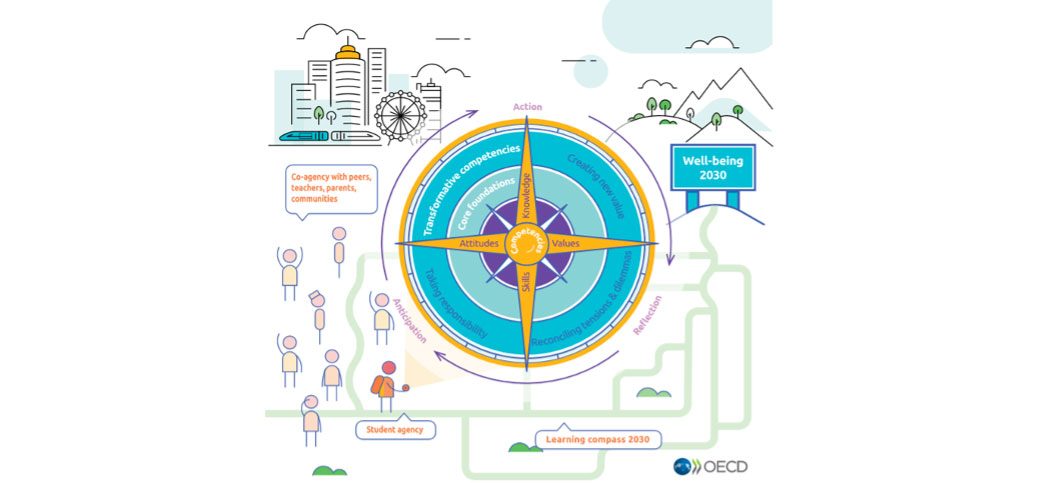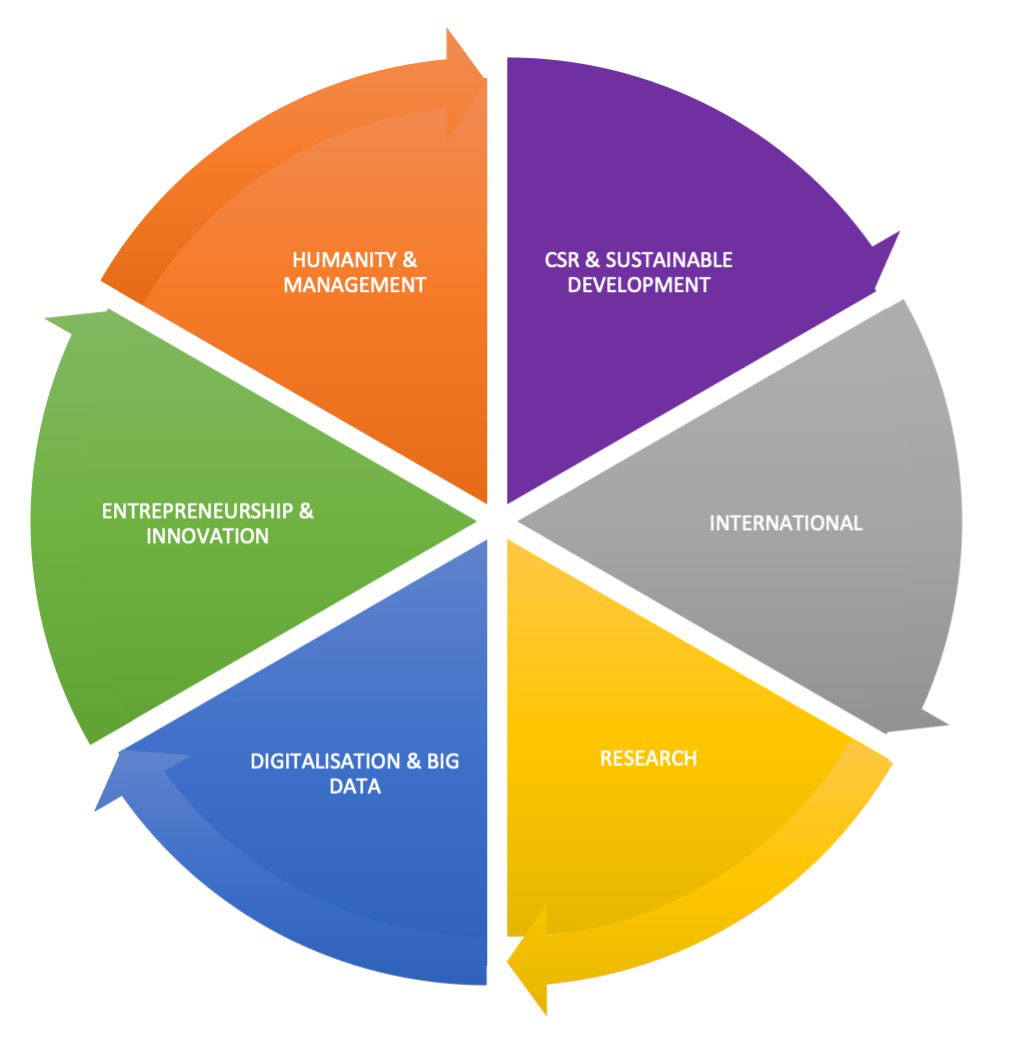‘Thinking outside the box’
Is Learning by doing something new? Well, not exactly...
Learning by doing, or project-based learning, has been an integral part of primary education since the end of the 19th century.
One of the very first experiments in this domain was carried out by the philosopher and educational reformer John Dewey (1859-1952), in the Laboratory School he founded, which was affiliated to the University of Chicago. It was through this pedagogical approach that young pupils learned how to read, to write, to count, to be considerate of others... Even back then, John Dewey believed that in order to learn, students had to be active participants, they had to learn to think and to solve problems, in order to prepare for living in the outside world, and for working with others.
In its Learning Compass 2030, the Organization for Economic Cooperation and Development (OECD) has identified three transformative competencies that are essential for students to be able to contribute to shaping a new complex world.
- The first of these competencies lies in the ability to create added value in order to encourage autonomy, the motor for change and innovation (creation of new jobs, new services, new techniques, new strategies, etc.). It is through questioning that we develop these competencies, and are able to ‘think outside the box’.
- The second competency concerns the ability to manage dilemmas, conflicting ideas and points of view. Students must learn to reason in order to defend their position and thereby find practical solutions to tense or contentious situations.
- Finally, the third competency relates to the social responsibility of each individual. Students must be aware of the impact of their actions on others as well as on the planet.

It was with this in mind that, for the start of the new academic year in September 2020, Excelia wanted to design a programme that would break with the traditional approach to pedagogy, built exclusively on Learning by doing.
The result is the Bachelor Foundation Year (BFY).
This BFY, awarding 60 ECTS credits, is equivalent to Year 1 of a Bachelor programme. Upon completion, students can join Year 2 of one of Excelia’s Bachelor programmes (BBA International, Bachelor in Business, Digital, or Tourism). It is aimed at students finishing High School who, for one reason or another, are undecided on their career path. It is also aimed at those who may have already had an unproductive first experience at a university or perhaps decided to put a hold on further education. Therefore for anyone who is still thinking about higher education, the Bachelor Foundation Year will provide them with a real opportunity to resume their studies.
To match the profile of those attracted by this programme, it seemed essential to consider a differentiated pedagogical approach, centred on the student and the enhancement of their competencies. Learning by doing, or project-based pedagogy, is an educational approach that motivates students, as they become actors in their own learning.
Our objective is to make this pilot programme a source of creativity, dynamism and teamwork. The aim is to ensure that learners become socially responsible citizens and to help them develop the necessary key skills to face a constantly changing world. The challenges of the future revolve around innovation, the creation of new professions and services, the development of knowledge, new opportunities, new technology, and new solutions, etc.
The revised Bachelor Foundation Year therefore focusses on the interdisciplinary skills common to Excelia’s 6 pedagogical imperatives, and reflects the strategic stance of the overall pedagogical project.

To achieve this, we have identified a common thread focussing on sustainable development, the circular economy, and CSR. All the projects that students undertake will therefore be closely linked to this central theme and will be carried out, as far as possible, in close collaboration with local companies.
The aim is to give our students a real sense of responsibility, so that they develop their ability to innovate, they strengthen their civic and social values, and they become drivers of change.
Examples of projects:
- Management of a professional research event such as the forum on Artificial Intelligence. The aim: to make young people aware of the emergence of AI and its effect on Humans, Organisations and Society
- Organisation of a 3-day educational event (EduParcours), visiting companies
- Creation of a sustainable company
- Development of a company abroad
- Case study focussing on the management of eco-tourism companies
- Programming workshops to develop web and mobile applications
- Civic and humanitarian projects, working with local associations
This pilot programme is ambitious and raises a number of challenges because, to date, it is the only programme offered by Excelia to have been developed exclusively with a Learning by doing approach.
The main difficulty lies in the clear and simple break with traditional teaching methods, thereby calling into question the role of the teacher and the learner.
Teachers take on the role of counsellor, facilitator, organiser, coach... they do not provide answers but help with the questioning.
As for learners, they apply their knowledge and skills to develop projects. They will be expected to problematise, obtain information, research, review, question, plan, communicate, etc.
Learners will build their knowledge through the projects undertaken, and the mistakes they make will be an integral part of the learning process. One of the challenges lies in the acceptance of mistakes as an essential element in the acquisition of new knowledge.
Another challenge is that of assessment.
As with any competency-based system that is dependent on several disciplines, Learning by doing raises the question of ‘how’ it can be assessed. It is not about assessing the learner using traditional evaluation methods but of thinking about a more appropriate and interdisciplinary assessment method that considers both the work of the individual and that of the group.
The involvement of the teaching faculty together with pedagogical coordination are essential. This project-based pedagogy will appeal to motivated teachers, often with experience in this field, who are particularly interested in pedagogical innovation and open to change.
We are counting on their involvement and their open-mindedness, because they are the driving force behind the success of this programme. Like them, if you are interested in contributing to the programme development, or perhaps supervising or supporting our students, please do not hesitate to join us.
There can never be too many of us ‘Thinking outside the box’!
References:
- SLAVIN (Robert E.), ‘Cooperative Learning and Academic Achievement: What makes Group-work work?
- ‘The Nature of Learning’: Using Research to Inspire Practice, CERI (OECD), 2010, p. 171-189
- L’apprentissage par projet : le point de vue de la recherche CATHERINE REVERDY [1]
- TECHNOLOGIE 186 MAI-JUIN 2013
- http://www.oecd.org/education/2030-project/
- http://www.tact.fse.ulaval.ca/fr/html/sites/guidep.html#1.1

 Mon orientation
Mon orientation





 Mon orientation
Mon orientation

